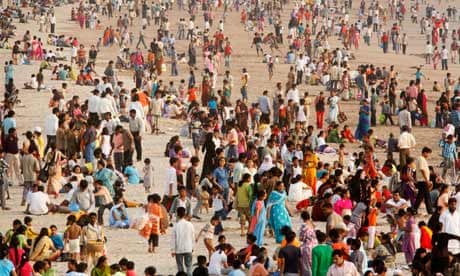At any public meeting on the environment over the past decade , there's one question that almost always came up. It is a variation of 'Why will no one talk about population?' As a result, population is discussed endlessly while people grumble that no one ever talks about it.
The same oddly circular conversation happened in the Observer Review section in an article relating to the new book, 10 Billion, by Stephen Emmott, head of Microsoft's Research Lab. Five full pages of extract and interview warned, 'we're ignoring … the biggest crisis in human history.'
Yet it's hard to ignore, in the circumstances.
We have World Population Day, the UN Population Awards, numerous organisations dedicated specifically to the issue, and just two weeks ago the UN published its latest, and widely reported, update on global population figures.
Government policies around the world on population are untiringly controversial and debated, from countries in Europe (like Germany) worried about declining populations, to those in Asia (like China) worried about the opposite.
Emmott, of course, does not appear to be anti-people, just concerned about the impact we're having on the planet, with climate change being key. He covers what is now very familiar ground describing human pressure on resources, talks generally about the need to reduce consumption, identifies rising population more specifically within poorer countries and suggests that we could be facing a world of 28 billion people by the end of the century (a dangerously loose and wildly unlikely figure to use for someone with a scientific reputation).
It's welcome to have such a senior, corporate figure concerned about the prospects for life on earth. The tone and alarmism echo Paul Ehrlich's 1968 classic, The Population Bomb.
You might expect from someone associated with a dominant, hard-nosed global corporation like Microsoft, a hard-nosed strategy and business plan to sort the problem out. But, having lamented 'the debate we urgently need,' on 'how billions more want to live, behave and consume,' it was frustratingly difficult across five pages to find a single, specific, constructive proposal about what we might do differently.
New energy from 'artificial photosynthesis', which Emmott mentions as one possible solution, might have novelty appeal but, you suspect, might be some way off from solving immediate problems. It was disappointing too because less novel but far more proven approaches are common knowledge. We've known for decades that universal primary education for women and good health services will do more to relieve the pressure for large families than any fiddling in the 'magic bullet' food lab.
Three years ago the science writer Fred Pearce, a knowledgeable and long-term observer of climate change and other natural resource issues, published a book called Peoplequake.
Although expecting population to grow (and level off later in the century), Pearce came to quite opposite conclusions. Future historians, he wrote, would look back on this period in history as marked by a, "dramatic decline in fertility and the transformation of the role of women in society." In recent years, writes Pearce, fertility rates have generally fallen off a cliff.
If there is an explosive problem, he wrote, it is to do with consumption, and it is a problem for a wealthy minority of humankind. The poorest three billion people on earth, short of half the world population accounted for about 7% of carbon emissions, while conversely, the richest 7% of people accounted for about half of all emissions.
More recently still the economist Danny Dorling wrote Population 10 Billion, accepting head-on that rising number. But Dorling too, like Pearce, is more sanguine. And, like many before, he makes the point that with better, much more equal distribution of resources, managing the needs of a rising population is far from impossible. 'There is more than enough to go round,' he writes.
The last point is no throw-away line. Current, extreme global inequality makes eradicating poverty impossible within planetary boundaries (and therefore impossible per se). That is because relying on trickle down, within a growth model already transgressing those boundaries, and in circumstances of great inequality creates the paradox of the already rich and over-consuming having to consume ever more for ever fewer benefits to reach the bottom of the income pile. This might be tastelessly political for some, but sharing better the resources we have to enable a rising number to thrive on a finite planet is also just plain maths, physics, biology and chemistry. An asymmetric consumption explosion remains our great problem.
Last week, President Obama waded into the climate debate saying, "We don't have time for a meeting of the Flat Earth Society ... I am here to say we need to act." A few years ago speaking in Cairo he said, 'Given our interdependence, any world order that elevates one nation or group of people over another will inevitably fail.' Apply that principle to the economy everywhere and we could solve several problems at once.

Comments (…)
Sign in or create your Guardian account to join the discussion